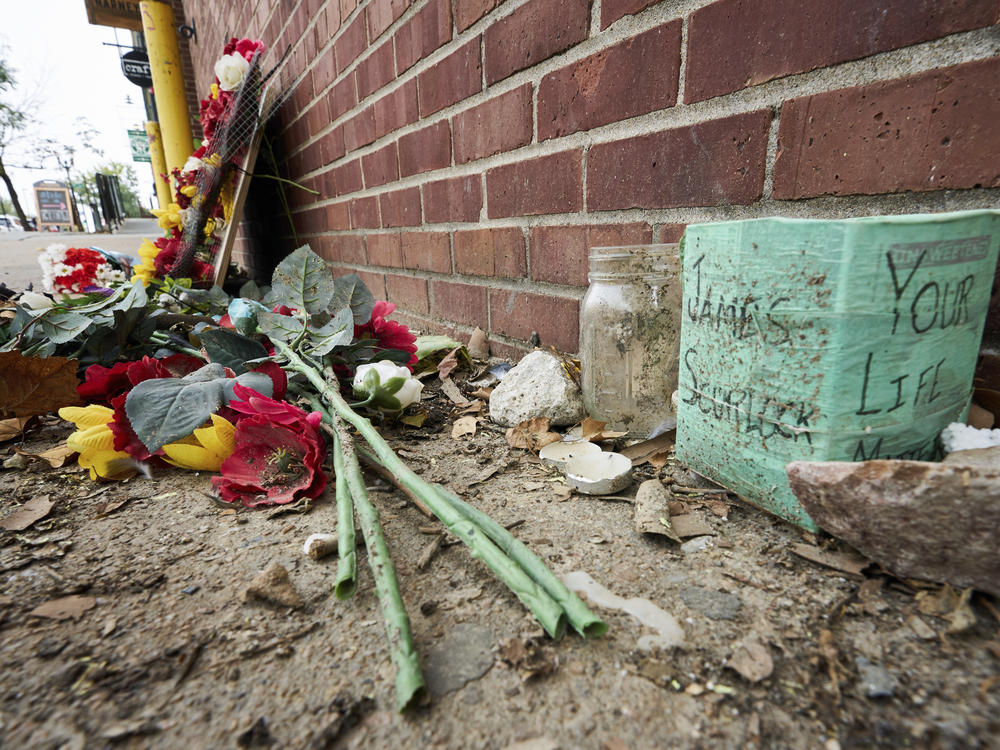Section Branding
Header Content
Omaha Grand Jury Indicts Bar Owner Over Fatal Shooting Of Black Protester In May
Primary Content
A grand jury in Omaha, Neb., on Tuesday indicted the white bar owner who fatally shot a Black man during protests for racial justice in May.
Jake Gardner shot 22-year-old James Scurlock in an altercation on May 30, during a tense night of protests in the city following the police killing of George Floyd in Minneapolis.
Initially, after reviewing video footage, Douglas County District Attorney Don Kleine ruled the shooting an act of self-defense and released Gardner from custody. He quickly reversed course and requested a grand jury and special prosecutor review the case, saying he hoped it would restore public faith in the justice system. Community members and Scurlock's family had called for such an investigation.
On Tuesday, special prosecutor Frederick Franklin announced that the grand jury had reached a decision. It charged Gardner with four counts: manslaughter, attempted first-degree assault, terroristic threats and use of a firearm in connection with a felony.
Franklin said at a news conference that when he signed on to the case earlier this summer, he also believed the shooting to be a case of justifiable self-defense.
"But I can tell you that there is evidence that undermines that," he said. "[And] that evidence comes primarily from Jake Gardner himself."
The 16-member grand jury had access to far more information than what was available at the time of the district attorney's initial decision, according to Franklin. He said Omaha police continued the investigation, conducting roughly 60 interviews and acquiring video clips from the public, which they passed on to Franklin's team.
Without going into specifics, Franklin outlined how each of the grand jury's charges relate to the events of May 30.
He said the terroristic threat count applies to Gardner's conduct in a verbal back-and-forth with Scurlock, and implied that Gardner was threatening the use of deadly force in the absence of receiving any such threats himself.
Gardner fired two shots before fatally striking Scurlock. Franklin said the jurors decided to charge the second of those, characterized as a "warning shot," as attempted first-degree assault.
The use of a firearm in connection with a felony charge is related to the manslaughter charge, Franklin said, noting "that particular count does not rest solely on an analysis of the video that has been played in the media already."
(Eyewitness video that circulated on social media after the shooting shows Gardner being pinned down on the ground apparently by Scurlock at one point during their altercation.)
He said the jury had access to evidence about Gardner's activities prior to the shooting, including information from his cell phone and Facebook Messenger account as well as video from inside the bar he owned.
"They were able to get evidence relative to Mr. Gardner's state of mind as a part of what was presented to them from this investigation," Franklin said.
NPR's Kirk Siegler reported in June that Gardner had posted on Facebook the night of May 30 that he was going to his bar for a "military style fire watch" as local protests over racial injustice escalated, and law enforcement officials later said Gardner's concealed carry permit had expired.
Franklin emphasized that the decisions announced on Tuesday are "simply charges," noting that grand jury indictments require a lesser burden of proof than is required for a conviction, and that Gardner is presumed innocent.
Still, he said he believes there is "competent, credible evidence" to support the grand jury's decision.
Gardner has not commented publicly since the charges were announced. Local ABC affiliate KETV reported that Gardner, a veteran, said prior to the indictment that he was "more anxious now than when [he] was flying to Iraq."
State Sen. Justin Wayne, who is representing the Scurlock family, told reporters on Tuesday that the indictment is something to appreciate rather than celebrate.
"While this family is thankful, this family is also still frustrated that it took this process to occur," he said, noting that Black men in Omaha are not typically given the benefit of the doubt.
Wayne also said the process still has "a long way to go."
In a statement shared with local television stations, Omaha Mayor Jean Stothert said the case against Gardner will move to trial, and asked the public to accept the grand jury's decision and respect its confidentiality.
As far as next steps, Franklin said on Tuesday that Gardner can either turn himself in or face an arrest warrant.
Copyright 2020 NPR. To see more, visit https://www.npr.org.

